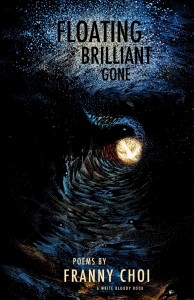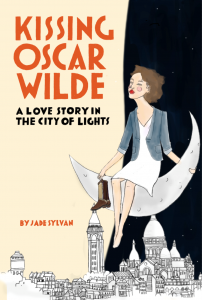88 pages, $15
Review by Aozora Brockman
Franny Choi’s “To the Man Who Shouted ‘I Like Pork Fried Rice’ at Me on the Street” in her debut book of poems, Floating, Brilliant, Gone, is refreshing. Finally an Asian American woman is flinging back sickening truths hidden within a cat-calling man’s words, delving deeply into his subconscious and into the consumerist desires that fuel sexism and racism. What the man is really saying, the speaker reveals, is that he wants to eat her like Chinese take-out, like she’s a “…butchered girl / chopped up & cradled in Styrofoam / for [him] – candid cannibal.” In few words Choi makes us both smell the taste of human meat wafting from the plastic and feel the violence of a perverse desire that stems from the swallowing of stereotypes of Asian American women. She is, in his imagination, exotic, “brimming / with foreign;” a prostitute from the “red-light district;” and dangerous like “worms in your stomach.” By revealing specific stereotypes hidden within the man’s cat-call, Choi makes clear the fallacies of the “she was just asking for it” argument, as it is obvious that it is his uncontrollable sexual hunger and media-saturated mind that is the causal factor. But the power that is gained from illuminating the nonsense behind normalized justification is measly compared to the physical revenge Choi dishes out in the final lines, in which she is “…squirming alive / in [his] mouth / strangling [him] quiet / from the inside out.” By the time the poem is over we don’t know if we should cheer or cry—after all, the speaker’s desire to gain back her power grows so immense that she takes the man’s life. We end, therefore, with a paradox of a woman and man murdering each other, and with a looming question: where is the fine line between fighting the good fight and replicating violence? Continue reading
![[PANK]](https://pankmagazine.com/wp-content/themes/pank/assets/images/pank-logo-large.png)


